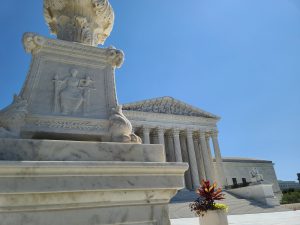On Friday, in US v. Heriberto Carbajal-Flores, a federal judge said 18 U.S.C. § 922(g)(5)’s ban on illegal immigrants owning guns violates the Second Amendment. That decision was right.
The answer to the core question here–whether illegal immigrants have Second Amendment rights under Bruen–really hinges on two sub-issues: first, what the framers meant by “the people,” and second, the criminal implications of unlawful immigration. The two wind up being frustratingly intertwined, but we’ll do our best to keep the analysis as linear as possible. Ultimately, it appears to me that disarmament based on immigration status alone is not consistent with the Second Amendment.
Bruen tells us that restrictions on the unqualified command of the Second Amendment–the right of the people to keep and bear arms–can only be upheld if the government can point to longstanding, historically analogous prohibitions. Thus, it is not enough to point to outliers, or prohibitions which bear only superficial similarities. Rather, how and why the historical analogue burdened the Second Amendment right controls. Historical disarmament of British loyalists, Native Americans, and black people fail as analogues to illegal immigrants as to both how and why they were disarmed.
Before we reach that point, though, we must establish whether non-citizens are part of “the people.” If they are not, we needn’t assess historical analogues, as their disarmament would be outside the text of the Amendment.
I think it’s quite clear that “the people” aren’t limited by immigration status. For one, at the time of the ratification, the Constitution used the word “Citizen” eleven times in the document. Certainly, then, we know the framers knew the term existed, and it was understood in the context of state Citizenship. Indeed, United States citizenship wasn’t even a concrete legal concept until the Naturalization Act of 1790, two years after the Constitution was ratified.
My dear friends Kostas Moros and Larry Keane posit that illegal aliens are not “the people,” referencing DC v. Heller dicta stating that “the people” “unambiguously refers to all members of the political community, not an unspecified subset.” My friends argue that “the political community,” a term I cannot endeavor to find in the Constitution, nor in the case Heller was citing, limits “the people” to those who are part of this undefined “political community.” My friends are not alone, either. Several district courts have adopted this reading. However, it fails upon the slightest examination.
Critically, when Heller referred to the “political community,” it did so in the context of dismissing the argument that the Second Amendment was a “collective right,” and not an individual one. The case Heller used to illustrate its point was US v. Verdugo-Urquidez, which declined to apply Fourth Amendment protections to a search by US authorities in Mexico, of the Mexican residence of a Mexican citizen who had no voluntary attachment to the United States. The “political community” illustration in Heller, when it pointed to Verdugo-Urquidez, was illustrating that “the people” is broadly understood in the fundamental rights context, and Verdugo-Urquidez shows an example of something beyond the boundary: an individual in another country with no voluntary connection to ours.
In contrast, citizenship at the time of the founding mattered for little aside from seeking political office, and was often limited to white freeholders. There is no historical evidence suggesting that white commoners, the majority of which could not vote, were without the right to arms. To the contrary, early militia acts compelled their armament based on able-bodiedness, not any political hook.
I see no way the “political community” dicta in Heller was intended to reverse hundreds of years of precedent where every other right of “the people” was respected within the borders of the United States without regard to whether the individual victim of state action was able to vote.
Further undermining the argument of my dear friends is the text of the Fourteenth Amendment, through which the Second is enforced against the states. In no uncertain terms, the Fourteenth Amendment refers to “the privileges or immunities of citizens,” then the “liberty” of “persons,” and the equal protection of laws of “any person within its jurisdiction.”
The point bears emphasis: to find that illegal immigrants are outside of “the people” protected by the Second Amendment, you must believe that the Framers were talking about a different “people” in the First, Fourth, Ninth, and Tenth Amendments.
If illegal aliens are part of “the people,” the question is then whether there are historical analogues to §922(g)(5), that being aliens “illegally or unlawfully in the United States; or” certain persons admitted to the United States under a nonimmigrant visa.
Before we examine historical analogues, we must take caution that a Bruen analysis doesn’t allow laws that would violate modern conceptions of due process and equal protection to carry the day. The “how and why” of the historical law must substantially match the “how and why” of the modern law.
First, in the negative, there were no laws affecting the possession of firearms by immigration status until 1968. The laws identified by §922(g)(5)’s supporters are of the ilk disarming Native Americans, blacks, insurrectionists, and British loyalists. Let’s analyze how and why those people were disarmed, and compare it to how and why people are disarmed under §922(g)(5).
With regard to Native Americans and blacks, it’s pretty clear they weren’t broadly considered “people” around the time of the founding. Thus, the application is dubious when compared to immigration status in a Second Amendment analysis presupposing them to be part of “the people.”
Still, at least with regard to Native Americans, as Kostas points out, they were predominantly understood as being part of a foreign nation or even enemy combatants until the 20th century.
This ties in with the disarmament of insurrectionists and British loyalists, who were quite reasonably understood to be enemy combatants at the time of the founding. As for the “how and why” with respect to loyalists and insurrectionists, as Judge Colman rightly pointed out, their right to arms was restored upon an oath to the United States and to the cause of liberty.
Now we must compare the how and why of §922(g)(5). How are illegal aliens disenfranchised of their right to peaceably keep and bear arms in defense of themselves and their families? Categorically. Why is this done? Well, we aren’t sure. The section was added without much tumult in Title VII of the Omnibus Crime Control and Safe Streets Act of 1968. How can aliens have this right respected, then?
The obvious answer is to simply “do it legally,” which for most people is nearly impossible. The modern process of attaining United States citizenship is far from that in the Naturalization Act of 1790, where one became eligible after simply remaining here for two years (as unlawful entry was not a legal concept until the 20th century). Rather, now, most migrants-to-be must literally win the lottery to be eligible for United States citizenship.
Lawful immigration to the United States is massively procedurally preconditioned. Individuals without special skills, individuals from countries that often seek to enter the US, and otherwise aren’t for some reason considered special by the federal government, have tremendous hurdles to overcome.
Historical categories of gun rights disenfranchisement hinged on what were understood to be dangerous persons, or not people at all. In the case of those lucky enough to be white, this disenfranchisement could be easily fixed by proving oneself to be friendly to the cause of liberty. Under modern law, where we’re thankfully less picky about who is and is not a person, and immigrants are categorically denied the fundamental right, these historical laws are not sufficiently analogous to §922(g)(5) to save it.







7 Responses
Heller uses the phrase “peaceable law-abiding citizens”.
You ignore two of the three. Based on the number of crimes we read about (unless you read only MSM), you ignore all of them.
Illegal immigrants are not “law abiding” BY DEFINITION. I’m sure your law school covered the difference between “legal” and “illegal”.
But the key term is “citizen”. That word means something, and it is why the Left, including you, wish to destroy the concept behind it.
A citizen is someone who has pledged to uphold the Constitution of the United States. While too few of us are educated on that responsibility, it is the converse of the rights a citizen enjoys. Until that prerequisite is fulfilled, full rights should not and are not bestowed.
Legal immigrants are those who have followed the laws established to enter this country, peaceably, and become guests. We the citizens allow them, as a courtesy, some of the rights we enjoy, so long as they remain peaceable and law abiding. We reserve the right to revoke that status at will, and at that time they must return to where they came from. If they are “peaceable” and “law abiding”, they DO. That’s why we allow them to exercise that right of a citizen; we presume the are innocent until proven guilty and no longer deserve it.
Please keep your responses to our writers civil. I understand passions are elevated on the issues we cover but I want everyone to be able to share their views openly. So, let’s keep things cordial.
Either provide me with an example of how my comment was uncivil or admit you are not interested in actual debate, sir. I used no bad language, or even anything that could be construed as a personal attack by anyone not solely interested in finding offense.
And this may be blunt but is not uncivil in context: Put up or shut up.
We’re trying to create a comments section that’s conducive to conversation. I want as many of our members and authors to feel as comfortable as possible discussing issues that are already contentious.
So, I won’t allow personal insults against other members or our authors. When you sarcastically said you were sure Matt had been taught the difference between legal and illegal it was very clearly meant as a personal insult. I also think your position on the issue was plainly made without that jab.
I want to be as clear as possible on the rules but we are a small publication and I don’t have a lot of time or resources to dedicate to comment moderation. Just please try to be as courteous as possible to others in this space and I’ll do my best to make sure they do the same for you. My goal here is to make sure people can express their ideas without having to worry about getting into a personal fight. I hope you agree that’s a worthwhile goal.
Thank you for telling me. Now that I know what you consider “uncivil”, I can avoid it in the future. The first step in any argument is defining your terms.
Thanks, man. I appreciate that. I know different sites have different standards and we haven’t talked at length about ours to this point. You’ve contributed a lot of great comments to the site, and I hope we keep hearing your point of view. I really like seeing issues through your perspective.
The whole discussion ought to be moot. If our government was a fraction as diligent as most others around the world, there simply would not be enough of them to make it an issue. It obviously is an issue because we haven’t managed border security for decades, and this administration has actively thwarted border enforcement. Only in bizarro world would such dereliction of duty be tolerated by a system with checks and balances.